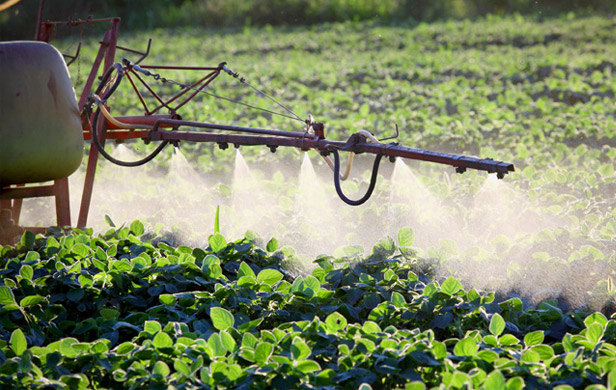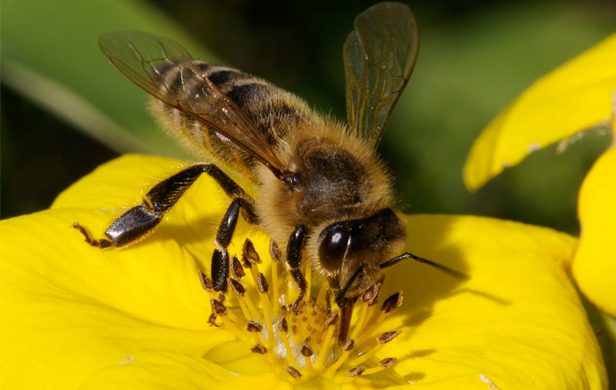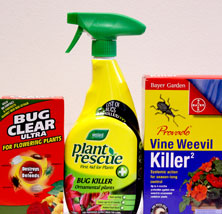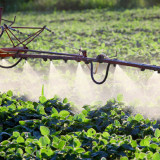
Bees may be small, but they play a big role in human health and survival. Some experts say one of every three bites of food we eat depends on them. The insects pollinate everything from apples and zucchini to blueberries and almonds. If bees and other pollinators are at risk, entire terrestrial ecosystems are at risk, and so are we.
New report slams neonic pesticides
Well, pollinators are at risk. And we know one of the main causes of their alarming death rates. A new report concludes that neonicotinoid pesticides, or neonics, “pose a serious risk of harm to honey bees and other pollinators.”
 They also harm butterflies, earthworms and birds, and because they’re now found in soils, sediment, groundwater and waterways, they alter “biodiversity, ecosystem functioning and the ecosystem services provided by a wide range of affected species and environments.”
They also harm butterflies, earthworms and birds, and because they’re now found in soils, sediment, groundwater and waterways, they alter “biodiversity, ecosystem functioning and the ecosystem services provided by a wide range of affected species and environments.”
The report, produced by the Task Force on Systemic Pesticides, is the work of 50 independent scientists from around the world who spent four years analyzing more than 800 peer-reviewed scientific studies.
Says lead author Jean-Marc Bonmatin of the National Centre for Research in France:
[quote]Far from protecting food production, the use of neonics is threatening the very infrastructure which enables it, imperilling the pollinators, habitat engineers and natural pest controllers at the heart of a functioning ecosystem.[/quote]
Other research shows they may not even increase agricultural yields.
Neonics kill wide range of species, can harm humans

Neonics are a family of chemicals with names like thiacloprid and imidacloprid. They disrupt the central nervous systems of insects and are undeniably great at killing pests like aphids and grubs. Unlike traditional pesticides, neonics are “systemic pesticides” that are most often applied to seeds and roots so the chemical becomes incorporated into the plants’ leaves, pollen, nectar, fruit and flowers.
According to the Task Force, “Neonics impact all species that chew a plant, sip its sap, drink its nectar, eat its pollen or fruit” and can remain toxic for weeks or months — even years. The impacts cascade through ecosystems, weakening their stability.
As nerve poisons, they can kill targeted and non-targeted species and can cause “impaired sense of smell or memory; reduced fecundity; altered feeding behaviour and reduced food intake including reduced foraging in bees; altered tunneling behaviour in earthworms; difficulty in flight and increased susceptibility to disease.” There’s also evidence they can harm human health, especially in infants.
Neonic pesticide ban faces powerful industry opposition
Neonics make up about 40 per cent of the world insecticide market, with global sales of US$2.63 billion in 2011 — and growing. That may explain why, despite increasing evidence that they’re harmful, there’s been such strong resistance to phasing them out or banning them.
[signoff3]
After experts concluded in 2013 that neonics pose an unacceptable risk to bees, the European Union imposed a temporary ban on the use of three neonics in applications that are particularly hazardous to bees — despite fierce opposition from the agrochemical industry and several governments. At the same time, Canada re-approved clothianidin, one of the chemicals banned in Europe.
In the face of conclusive findings from hundreds of studies, industry reaction has been astounding. Said Julian Little, spokesperson for neonicotinoid manufacturer Bayer:
[quote]There is very little credible evidence that these things are causing untoward damage because we would have seen them over 20 years of use.[/quote]
Canadian agricultural pest control trade association CropLife Canada also rejected the science, blaming bee deaths on varroa mites, another serious threat to honeybees. And even though Canada’s Pest Management Regulatory Agency confirmed neonics used on corn seed contributed to bee die-offs in Ontario and Quebec, federal Health Minister Rona Ambrose has so far rejected a ban, saying her department’s research is “inconclusive.”
Time for governments to step up
What will it take to get governments and industry to put people — and pollinators — before profits? Around the world, concerned individuals and organizations are calling on decision-makers to get serious about this threat. At writing, more than 27,000 have signed a David Suzuki Foundation action alert asking federal and provincial governments to ban the use and sale of neonics.
It’s the government’s duty to protect us from potentially harmful chemicals. With neonics, the science is clear: they’re unsafe. Researchers say “there is clear evidence of harm sufficient to trigger regulatory action.” They’re calling them “the new DDT”. It’s time to ban these harmful pesticides.
Written with Contributions from David Suzuki Foundation Senior Editor Ian Hanington.


NORAHG RESPONDS TO DAVID SUZUKI
David Suzuki is WRONG ! On June 24th, 2014, a non-expert assessment by International Union for the Conservation of Nature ( IUCN, a.k.a. Task Force On Systemic Pesticides ), an anti-pesticide lobby-organization, alleged that neonicotinoid insecticides MAY be harming a range of species and MAY be responsible for so-called bee colony collapse disorder. This assessment by IUCN has been FRAUDULENTLY USED by anti-pesticide activists like Suzuki ! IUCN is deceiving the public about neonicotinoid insecticides. IUCN’s reckless and arbitrary demands to prohibit against neonicotinoid insecticides will not resolve so-called bee colony collapse disorder, and will not help bee-keepers with their pest problems. The fraudulent misuse of the non-expert IUCN report is designed to alarm and enrage the public into arriving at inappropriate conclusions about neonicotinoid insecticides. The non-expert IUCN report concocts the story that there is some kind of bee crisis. There is no bee crisis. Clearly, the principal mandate of IUCN has been to attract more members, more donations, and more profit by scamming the public with the concoction of fraudulent lies and imaginary danger about neonicotinoid insecticides. There is a growing and conclusive body of evidence about IUCN squandering and misappropriating its public donations on subversive and partisan anti-pesticide conspiracies. There is also conclusive evidence that IUCN is interfering with partisan politics, and is in violation of taxation laws in several jurisdictions. Consequently, IUCN does not deserve any donations or support. Nor does it deserve a charity tax-exempt status. Scientific research shows, as reported through EPA’s and Health Canada’s vast scientific database, that no harm will occur to bees when neonicotinoid insecticides are used properly. There is no bee crisis. Science and statistics do not support IUCN’s reckless and arbitrary demands to prohibit against neonicotinoid insecticides. There are no IUCN activists who have any background, training, or education in matters concerning neonicotinoid insecticides. Any IUCN opinion is valueless and worthless. If we had less conventional neonicotinoid use in the environment, we would still have bee colony collapse disorder, because many bee-keepers are not competent to manage their hives. The whole truth about neonicotinoid insecticides can be found at … http://wp.me/P1jq40-2BA http://wp.me/p1jq40-6WJ http://wp.me/p1jq40-6H8 The whole truth about IUCN can be found in the following report … http://wp.me/p1jq40-85q NORAHG is the National Organization Responding Against HUJE that seek to destroy the Green space industry. WILLIAM H. GATHERCOLE AND NORAH G. Get the latest details at The Pesticide Truths Web-Site http://pesticidetruths.com/ and go to The Complete Library Of Web-Pages, Reports, & References http://wp.me/P1jq40-2rr
Are you in fact a bee keeper? The fact that you are anti-beeks tells me alot about your judgement of those trying to do something positive about all that has gone awry with the health of these most important pollinators. I am scratching my head wondering why anyone would be FOR the use of more and more pesticides. The word in itself suggests that insects are pests. In fact, all insects are here for a purpose. By killing them off to make food “pretty” you are not only harming the very pollinators who create our food, but systemically putting it into the very food we are eating. No thank you! There needs to be a balance in nature. We are trying to be God and through nature on its ass. You can quote all the pro-pesticide propaganda you like – I will never agree that more use of it is OK for us to consume.
I don’t think the government knows that it has a duty to do anything for the people. It seems they are all for themselves! WE are all in the same boat .
Time to expose Bayer CropScience donations to universities like Guelph in Ontario. Can their scientific integrity be trusted?
University of Guelph has become the PROPAGANDA SHIELD to FALSELY VALIDATE PROHIBITION against pest control products. It is UNLIKELY that ANY amount of money will affect this university policy.